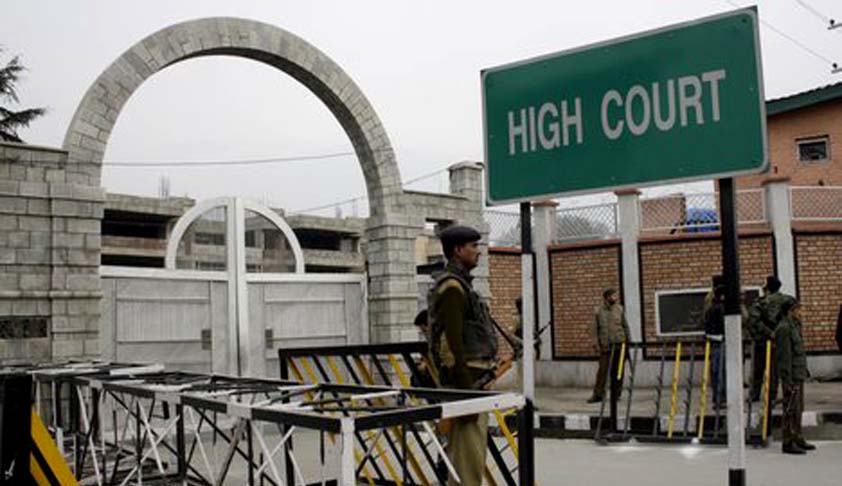Rule 187 can be invoked within probation period only
Mohinder Verma
JAMMU, May 12: In a significant judgment, a Division Bench of High Court of Jammu & Kashmir and Ladakh comprising Chief Justice N Kotiswar Singh and Justice Wasim Sadiq Nargal has held that stigmatic order of termination of any employee cannot be passed without conducting detailed enquiry and providing an opportunity of being heard.
It has further held that powers under Rule 187 of J&K Police Manual can be invoked only against a probationer within a period of probation—three years from the date of enrolment and not to a permanent employee.
The judgment has been passed in a writ petition filed by one Shamim Ahmad, constable in Jammu and Kashmir Armed Police, seeking quashment of judgment and order dated July 1, 2021 passed by the Central Administrative Tribunal (CAT) Jammu by virtue of which the petition against the order of discharge was dismissed without following principle of natural justice. The petitioner further sought quashment of order dated October 31, 2009 by virtue of which, the petitioner has been discharged without enquiry and without following principle of natural justice.
After hearing Advocate Sarfaraz Hamid Rather for the petitioner and Senior Additional Advocate General Monika Kohli for the UT of J&K, the Division Bench observed that the petitioner was discharged from the services from the date he remained absent–7th September, 1994 in terms of Rule 187 of J&K Police Manual by attaching stigma to the order on the ground that “he had not proved to be a good police officer and his conduct didn’t remain satisfactory during the probation period”.
“In the earlier writ petition the order impugned dated 2nd November, 1994 passed by the respondent stood quashed and the respondents were given liberty to pass orders either under Rule 187 of J&K Police Manual in case they so choose or conduct regular enquiry”, the DB said, adding “however, the respondents without conducting the detailed enquiry, discharged the petitioner from the services by relying upon the Rule 187 of the Jammu and Kashmir Police Manual and by attaching stigma”.
Stating that order impugned is not a simpliciter but punitive in nature, the DB observed, “the language and the expression used in the order of discharge is stigmatic in nature and the petitioner has been categorized as a bad police officer, which renders the impugned discharge order bad in the eyes of law”, adding “the expression used in the impugned order would disentitle the petitioner to seek an employment in future. Such type of order can be passed only when regular departmental enquiry is conducted”.
“It is well settled law that right to life and personal liberty is one of the fundamental rights guaranteed to a person under Article 21 of the Constitution of India, which would include right to livelihood, as such, before taking any action with a view to put an end to the services of the petitioner, it requires a reasonable opportunity to be given to the petitioner to putforth his case so as to comply with the universally accepted principles of natural justice, which has not happened in the present case”, the DB said.
The DB further observed, “the finding recorded in the order of discharge is based on allegation of misconduct, as such, the respondents were under legal obligation to conduct a regular enquiry by affording an opportunity of being heard to the petitioner which has not been done”, adding “a person can be discharged under Rule 187 by way of discharge simplicitor though the motive may be because of omission and commission on the part of the incumbent. However, it is not necessary to mention those omissions and commissions in the termination or discharge order”.
“In case any such reason is given in the discharge order showing the deficiency in the service of the incumbent, it would amount to be stigmatic and if such a discharge order is put to challenge, may not sustain on the ground being stigmatic. However, if the discharge order is simply passed without mentioning the deficiency of incumbent, it would be a discharge simplicitor in which event such a discharge order can be sustained”, the DB further said.
“When the order of discharge is stigmatic, then without enquiry, the same cannot be passed by invoking the power under Rule 187 of the Jammu and Kashmir Police Manual”, the DB said, adding “the powers under Rule 187 can be invoked only against a probationer within a period of probation– three years from the date of enrolment and not to a permanent employee after a period of 15 years from the date of his appointment as in the present case”.
Stating that service of petitioner is protected under Article 311(2) of the Constitution of India and the procedure as envisaged under the Constitutional provision was required to be followed by giving an opportunity of being heard to the petitioner and also by issuing show cause notice to him, the DB said, “we find merit in this petition and the same is, accordingly, allowed”.
Accordingly, DB quashed the impugned order dated July 1, 2021 passed by the Central Administrative Tribunal (CAT) Jammu and order of discharge dated September 30, 2009 with the direction to the respondents to reinstate the petitioner with immediate effect.
“The petitioner is also held entitled to all the consequential benefits minus monetary benefits retrospectively from the date he joined his services—-23rd February, 1993”, read the judgment authored by Justice Wasim Sadiq Nargal.


